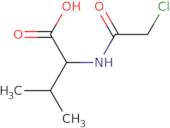N-Chloroacetyl-L-valine
CAS: 2279-16-5
Ref. 3D-CAA27916
| 1g | Discontinued | ||
| 5g | Discontinued | ||
| 100mg | Discontinued | ||
| 250mg | Discontinued | ||
| 500mg | Discontinued |
Product Information
- (2S)-2-(2-Chloroacetamido)-3-methylbutanoic acid
- (2S)-2-[(2-Chloroacetyl)amino]-3-methyl-butanoic acid
- (S)-2-(2-Chloroacetamido)-3-methylbutanoic acid
- <span class="text-smallcaps">L</span>-Valine, N-(2-chloroacetyl)-
- <span class="text-smallcaps">L</span>-Valine, N-(chloroacetyl)-
- Chloroacetyl-L-valine
- N-(2-Chloroacetyl)-<span class="text-smallcaps">L</span>-valine
- N-(chloroacetyl)-L-valine
- N-(chloroacetyl)valine
- N-Chloroacetyl-<span class="text-smallcaps">L</span>-valine
- See more synonyms
- NSC 97928
- Valine, N-(chloroacetyl)-, <span class="text-smallcaps">L</span>-
- Valine, N-(chloroacetyl)-, L-
- L-Valine, N-(chloroacetyl)-
- L-Valine, N-(2-chloroacetyl)-
- N-(2-Chloroacetyl)-L-valine
N-Chloroacetyl-L-valine is a chiral amino acid that is synthesized by the racemization of L-valine. It has been shown to be an intermediate in the biosynthesis of N-acetyl-L-tyrosine, which is a key intermediate for the synthesis of dopamine, serotonin and epinephrine. A sequence analysis of this product revealed a number of hydrophobic interactions with residues in proteins. The optimum pH for this product is around 7.0 and it can be used as an expression plasmid in actinomycetes. This product also binds metal ions such as dodecyl ion, which may have functional groups such as n-acetyl-l-tyrosine or metal ion binding sites.





